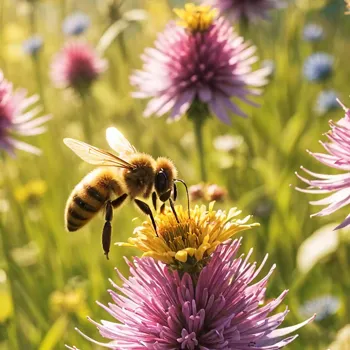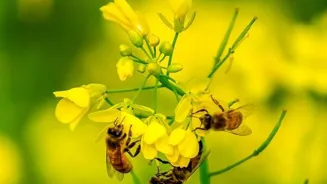Discover the vital role bees play in Indian agriculture and why their well-being is crucial for the future. Read on to uncover 7 fascinating facts about these unsung heroes!
India, a land of vibrant agriculture,
often overlooks the tiny heroes playing a massive role in its success: bees.
These buzzing insects are far more than just honey producers; they are crucial for the pollination of countless crops, ensuring food security and boosting the livelihoods of farmers across the nation.
Let's celebrate these vital creatures and understand why their well-being is intrinsically linked to the future of Indian agriculture.
Bees crucial for pollination, vital for agriculture and economy
Bees are critical for pollination, the process by which plants reproduce. They carry pollen from one flower to another, allowing fruits, vegetables, and seeds to develop.

Without bees, many of our staple crops would struggle to produce yields, leading to food shortages and economic hardship for farmers. By actively foraging for nectar and pollen, bees contribute significantly to the economy. Their role in sustaining plant life is essential for agriculture.
Recognizing their importance helps preserve the delicate ecological balance.
Bee pollination boosts crop yields in India
Studies have shown that bee pollination can increase crop yields by a significant margin. For example, crops like mustard, sunflower, and various fruits benefit immensely from bee pollination, resulting in larger and higher-quality harvests.
Farmers who incorporate beekeeping into their agricultural practices often see a considerable increase in their overall income. Bees also promote genetic diversity. This enhanced pollination is the main contributor for increasing yields and overall growth in farms across India.
Bees vital for ecosystem health and biodiversity
Bees don't just pollinate crops; they also play a vital role in maintaining the health and diversity of natural ecosystems. They pollinate wildflowers and other plants, which in turn support a wide range of other insects, birds, and animals.
A healthy bee population is an indicator of a healthy environment. Protecting bees means protecting a complex web of life that sustains us all. Without bee pollination, several plant species could disappear over time. This helps keep the overall environmental balance.
Beekeeping: Profitable venture for rural communities
Beekeeping can be a profitable venture for farmers and rural communities. It requires relatively low investment and can be integrated into existing agricultural systems. Honey, beeswax, and other bee products can be sold for income, providing a supplementary source of revenue for rural families.
Beekeeping also provides employment opportunities for women and landless labourers, contributing to rural economic development. It is important to invest in training and support programs. This will help farmers acquire skills and knowledge for beekeeping.
Healthy bee populations aid in pest control and sustainable agriculture
While not directly involved in pest control, healthy bee populations contribute to a balanced ecosystem that is more resistant to pests and diseases. Strong, diverse plant communities, supported by bee pollination, are better able to withstand pest outbreaks.
Additionally, some bee species prey on crop pests, providing a natural form of pest control. This ecosystem service is often overlooked but plays a vital role in sustainable agriculture. Their presence can act as a natural deterrent.
It can reduce the need for chemical pesticides which is beneficial for the environment.
Beekeeping benefits small farmers, boosts income and food security
Beekeeping is particularly beneficial for small and marginal farmers who may not have access to expensive technologies or inputs. Bees can improve the productivity of their small landholdings, providing them with a sustainable source of income and food security.
Beekeeping can also empower women farmers, who often play a significant role in managing bee colonies. Bees can have a big impact on farming profits. This can improve the lives of many farmers and families.
Bees symbolize sustainable agriculture practices
Bees are increasingly being recognized as a symbol of sustainable agriculture. Their presence indicates a healthy ecosystem and sustainable farming practices.
Farmers who prioritize bee-friendly practices, such as reducing pesticide use and planting pollinator-friendly crops, are contributing to a more sustainable and resilient agricultural system.
Protecting bees is not just about protecting a single species; it's about protecting the future of agriculture and the environment. Sustainable methods ensure that they continue pollinating. This helps keep the ecosystem healthy.
Honey and bee products offer health benefits and income
While often thought of just for Honey, it has several health benefits. In Ayurveda, this has been used for its medicinal properties. The honey from crops and bee products offers additional income for the farmers. Beeswax is used for making candles and cosmetics which has a high market value.
Propolis is the resin like substance collected by bees. Propolis, pollen, and Royal Jelly contain vitamins.
Bee populations face threats; promote bee-friendly practices to protect bees
Despite their importance, bee populations are facing numerous threats, including habitat loss, pesticide use, and climate change. It's crucial to adopt bee-friendly farming practices, such as reducing pesticide use, planting pollinator-friendly crops, and creating bee-friendly habitats.
Promoting beekeeping through training and support programs can also help to increase bee populations and improve livelihoods. Protecting bees is a shared responsibility that requires the collective efforts of farmers, policymakers, and consumers.
Protecting bees vital for sustainable agriculture in India
Let's celebrate the vital role of bees in Indian agriculture and work together to ensure their survival for generations to come. By protecting these tiny heroes, we can build a more sustainable and food-secure future for India.
Raising awareness about the importance of bees, educating farmers about bee-friendly practices are critical. We must emphasize the need to safeguard these little insects which will benefit the agriculture sector hugely.



















